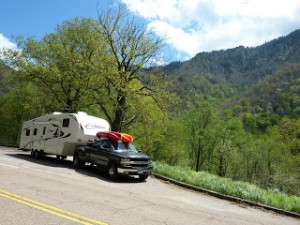 Let’s talk about safe towing for drivers. Too often many drivers will just slap a trailer on the hitch and take off. But there are safety considerations to protect your tow vehicle, comply with Colorado laws and limit your liability.
Let’s talk about safe towing for drivers. Too often many drivers will just slap a trailer on the hitch and take off. But there are safety considerations to protect your tow vehicle, comply with Colorado laws and limit your liability.
First of all, know your tow vehicle. Your options will affect the tow rating, so you need to carefully read the towing section of your manufacturer’s owner’s manual to know how much your vehicle can tow.
Next, you need to know the weight limits of your trailer hitch. It will have a maximum tongue limit and an overall limit.
Third, know your hitch type: a weight-distributing hitch may be required by your manufacturer for certain trailer weights.
And fourth, know the towing laws for the areas in which you’ll be towing, as they may have stricter equipment requirements.
Your owner’s manual will also give you some help in determining how to calculate how much weight you can tow. It’s more complicated than the maximum weight the marketing guys trumpet. There are two codes drivers can find on the driver’s side door. One is GVWR- or Gross Vehicle Weight Rating. This is the maximum weight of the tow vehicle, including passengers and cargo.
The other is GCWR – or Gross Combined Weight Rating. This is the combined weight of the vehicle, passengers, cargo and loaded trailer.
Every locality requires safety chains and they also have regulations for when trailer brakes are required in Colorado. The tires on your vehicle and trailer should be in good condition and have the proper load rating. Your suspension should be inspected to make sure it can handle the load. Also your transmission may need additional fluid cooling, so check with your Express Car Care service adviser about adding a transmission cooler and/or performing maintenance.
Carefully follow your vehicle’s towing guidelines to maximize your safety, protect your vehicle from damage and protect yourself from liability.
A quick note on your trailer: wheel bearings on trailers are often neglected by drivers. They need to be serviced on schedule to avoid failure. This is especially important for trailers that are driven through water.
If this safe towing guide has made you aware of any services you might need on your vehicle, come and see us at Express Car Care in Denver, we can help.
